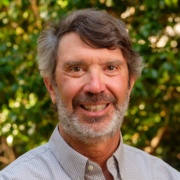Dennis Baldocchi, Professor of Biometeorology, University of California, Berkeley

Please include details about your educational background and what sparked your interest in atmospheric or related sciences.
I received my BS degree in atmospheric science from University of California, Davis. I was interested in weather and climate from my experience being reared on a walnut ranch. But as a youth I was not sure how to proceed, coming from a rural school. All I knew was that I liked science and math in high school, I had no idea what an engineer did and was disinclined to study meteorology at big city schools like UCLA and San Jose State University to be a weather forecaster on TV. An article on weather and atmospheric science by Walter Orr Roberts in National Geographic was pivotal. Then I learned that there was an atmospheric science major at UC Davis during a campus visit that was part of a 4H leadership conference. Things began to fall into place. Studying atmospheric science at an agricultural school was a great foundation for following my interests in agricultural meteorology and biometeorology. This interest took me to graduate school at the University of Nebraska, where they had an established program on this topic, to earn my MS and PhD degrees.
What was your first job in the field and how did you end up in the job you are in now?
My postdoc was as a biometeorologist at the NOAA Atmospheric Turbulence and Diffusion Division in Oak Ridge, Tennessee where they had an established forest meteorology program. This postdoc turned into a permanent position with NOAA and eventually a transition to UC Berkeley as a professor of biometeorology.
What opportunities did you pursue that you knew would be beneficial to securing a job in the profession?
Learning from successful people who came ahead of me, it was obvious that it was important to write papers and publish to get opportunities. I also learned about grant writing by reading the proposals of my mentors.
What other courses/skills beyond the required math and science courses do you think would be the most helpful to individuals wanting a career in your profession?
Communication skills are very important, both oral and written. Developing leadership skills is also important. As a scientist, I think it is important to gain experimental and theoretical/modeling skills. And of course get out into nature and see, touch, and feel the systems you are studying. I worry too many are viewing the environment like a video game with easy access to remote sensing and the Google Earth engine.
What is your typical day on the job like?
No day is the same. But over the course of a week or month these are the things I do. They include dealing with emails, reading literature, writing code, analyzing data, writing and thinking, interacting with the team, travel and attending meetings, and reviewing and editing papers and proposals.
What do you like most about your job? What is the most challenging thing about your job?
Interacting with my students, postdocs, and technicians on our research, discussing ideas, and looking at and interpreting results. Keeping up with the explosion in literature and mastering so many new quantitative skills is daunting.
Does your job allow for a good work/life balance? If not, why?
I make sure it does. When I was younger (until my 50s), I played soccer regularly, including outdoor and indoor leagues and pickup games. Now, I hike regularly and I have joined a group who compete throwing discus weekly and compete at Master's track meets. It is my experience that many people who tend to work over 50 hours tend not to spend their time as efficiently as possible. So it is important to value your time and have a balance. Through the bulk of my career I worked about 50 hours a week and religiously did not work in the evenings.
Over the course of your career what is the most exciting thing that has happened to you?
Hard question to answer over a 40 year career. Most obvious is a chance to be hired by Berkeley, return to California, and address many of the research questions about California’s environment that interested me.
Is there anything you wish you had done differently in your career?
I have no regrets. I think it is important to work with the hand dealt to you and then evolve over time as you mature and gain new experiences and opportunities.
What are some “must haves” on a resume if a person wants to gain employment in your field?
A good publication record on topics that are at the forefront of the field open many doors. It is a strength to be trained by a leading group in the field. This also opens doors. But the best prospects remain curious and have an infectious desire to learn and explore the world about them.